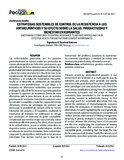Mostrar el registro sencillo del ítem
Estrategias sostenibles de control de la resistencia a los antihelmínticos y su efecto sobre la salud, productividad y bienestar en rumiantes
| dc.rights.license | http://creativecommons.org/licenses/by-nc-sa/3.0/ve/ | |
| dc.contributor.author | Sandoval, Espartaco | |
| dc.date.accessioned | 2017-12-08T05:47:01Z | |
| dc.date.available | 2017-12-08T05:47:01Z | |
| dc.date.issued | 2017-12-08T05:47:01Z | |
| dc.identifier.uri | http://www.saber.ula.ve/handle/123456789/44167 | |
| dc.description.abstract | Las enfermedades provocadas por los parásitos gastrointestinales en nuestro medio son producidas de manera pluriespecífica por helmintos y protozoarios, que generalmente de forma silenciosa causan pérdidas en la productividad del sistema, predisponen a otras patologías y elevan los costos de producción. Una de las más serias complicaciones derivadas de la explotación de rumiantes domésticos y el empleo de tratamientos frecuentes, resulta en el desarrollo de poblaciones de nematodos resistentes a los antihelmínticos , lo cual obliga a la búsqueda de alternativas sostenibles, que permitan prolongar la vida útil de los recursos quimioterapéuticos y retarden la aparición de resistencia. Dentro de estas alternativas vale la pena destacar el uso de animales genéticamente resistentes, tratamientos selectivos sobre los animales susceptibles y resilentes, mejora del manejo alimentario, diseño de estrategias de pastoreo que disminuyan la posibilidad de contacto entre las formas infectantes del parásito y el hospedero, resaltando la importancia de mantener las poblaciones en refugio que constituyen un reservorio de genes susceptibles, considerando que mientras mayor sea su tamaño, menor será el desarrollo de resistencia. Por último, el uso racional de los antihelmínticos, ya que su empleo sistemático sin diagnóstico previo y sin bases epidemiológicas, resultan en selección de parásitos resistentes, daños ambientales, riesgo para la salud pública y detrimento en los procesos industriales. Esto permite concluir que la base de la intervención del problema parasitario la representan los exámenes coprológicos y medidas de manejo que favorezcan la productividad y el bienestar animal. | es_VE |
| dc.language.iso | es | es_VE |
| dc.rights | info:eu-repo/semantics/openAccess | |
| dc.subject | antihelmínticos | es_VE |
| dc.subject | genética | es_VE |
| dc.subject | nutrición | es_VE |
| dc.subject | parásitos | es_VE |
| dc.subject | resistencia | es_VE |
| dc.title | Estrategias sostenibles de control de la resistencia a los antihelmínticos y su efecto sobre la salud, productividad y bienestar en rumiantes | es_VE |
| dc.title.alternative | Sustainable strategies to control resistance to anthihelmintics and their effect on health, productivity and confort in ruminants | es_VE |
| dc.type | info:eu-repo/semantics/article | |
| dc.description.abstract1 | Diseases caused by gastrointestinal parasites in our environment are produced in a multi-specific way by helminths and protozoa, which generally and silently cause loss in the productivity of the system, predispose to other pathologies and raise production costs. One of the most serious complications, arising from the exploitation of domestic ruminants and the usage of frequent treatments, have contributed to the development of nematodes resistant to anthelmintic forcing to find (pursuing) search for sustainable alternatives that may extend life usefulness of chemotherapeutic resources and delay the emergence of resistance. Among these alternatives, it is worth highlighting the use of genetically resistant animals, selective treatments on susceptible and resilient animals, improvement of feeding management, designing of grazing strategies to reduce the possibility of contact between the infecting forms of the parasite and the host, emphasizing the importance of keeping populations in shelter that constitute a reservoir of susceptible genes, considering that the larger the size, the less resistance will develop. Finally, the rational use of anthelmintic, since their systematic use without previous diagnosis and epidemiological bases, result in selection of resistant parasites, environmental damages, risk to public health and detriment in industrial processes. This leads to the conclusion that the basis of the intervention of the parasitic problem is represented by coprological examinations and management measures that favor productivity and animal welfare. | es_VE |
| dc.description.colacion | 87-98 | es_VE |
| dc.description.email | partacos@hotmail.com | es_VE |
| dc.identifier.edepositolegal | PPI 200502ME4431 | |
| dc.identifier.eissn | 2343-6174 | |
| dc.publisher.pais | Venezuela | es_VE |
| dc.subject.facultad | Núcleo Rafael Rangel (NURR) | es_VE |
| dc.subject.institucion | Universidad de Los Andes | es_VE |
| dc.subject.keywords | genetics | es_VE |
| dc.subject.keywords | nutrition | es_VE |
| dc.subject.keywords | anthelmintic | es_VE |
| dc.subject.keywords | parasites | es_VE |
| dc.subject.keywords | resistance | es_VE |
| dc.subject.pais | Venezuela | |
| dc.subject.publicacionelectronica | Revista Mundo Pecuario | |
| dc.subject.seccion | Revista Mundo Pecuario: Artículos | es_VE |
| dc.subject.tipo | Revistas | es_VE |
| dc.type.media | Texto | es_VE |
Ficheros en el ítem
Este ítem aparece en la(s) siguiente(s) colección(ones)
-
Mundo Pecuario - Vol. 011 - Nº 3
Septiembre - Diciembre 2015


